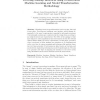Free Online Productivity Tools
i2Speak
i2Symbol
i2OCR
iTex2Img
iWeb2Print
iWeb2Shot
i2Type
iPdf2Split
iPdf2Merge
i2Bopomofo
i2Arabic
i2Style
i2Image
i2PDF
iLatex2Rtf
Sci2ools
261
Voted
OTM
2015
Springer
2015
Springer
Evolving Mashup Interfaces Using a Distributed Machine Learning and Model Transformation Methodology
Nowadays users access information services at any time and in any place. Providing an intelligent user interface which adapts dynamically to the users’ requirements is essential in information systems. Conventionally, systems are constructed at the design time according to an initial structure and requirements. The effect of the passage of time and changes in users, applications and environment is that the systems cannot always satisfy the user’s requirements. In this paper a methodology is proposed to allow mashup user interfaces to be intelligent and evolve over time by using computational techniques like machine learning over huge amounts of heterogeneous data, known as big data, and model-driven engineering techniques as model transformations. The aim is to generate new ways of adapting the interface to the user’s needs, using information about user’s interaction and the environment.
| Added | 16 Apr 2016 |
| Updated | 16 Apr 2016 |
| Type | Journal |
| Year | 2015 |
| Where | OTM |
| Authors | Antonio Jesús Fernández-García, Luis Iribarne, Antonio Corral, James Zijun Wang |
Comments (0)

